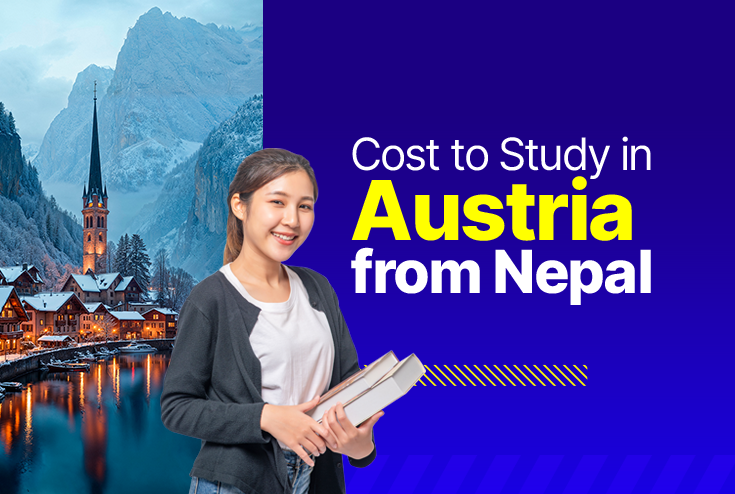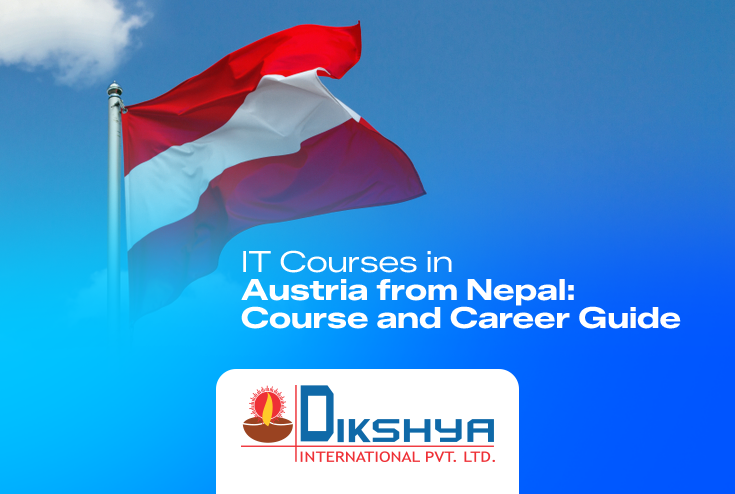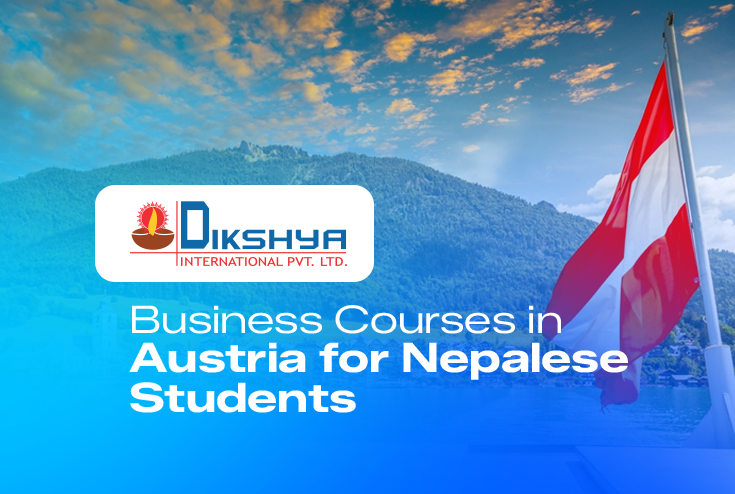
Cost to Study in Austria: Tuition, Visa & Living
Studying in Austria offers Nepali students a rare combination of high-quality education, affordable tuition fees, and access to the vibrant European lifestyle. Compared to many other EU countries, Austria provides relatively low education and living costs, making it a top destination for Nepali students seeking value for money.
In this guide, we’ll break down the total cost to study in Austria from Nepal in 2025, covering everything from tuition fees and living expenses to visa costs, scholarships, and more.
Table of Contents
- Why Choose Austria for Higher Studies?
- Tuition Fee in Austria for Nepali Students
- Living Expenses in Austria for International Students
- Visa Costs for International Students in Austria
- Scholarship Opportunities for International Students in Austria
- Conclusion: Is Austria Affordable for Nepali Students?
- Start Your Journey to Study in Austria – With Dikshya International!
- FAQs - Cost to Study in Austria from Nepal
Why Choose Austria for Higher Studies?
Austria has steadily emerged as a top study destination for Nepali and other international students due to its exceptional education quality, affordability, and global exposure. Here's why Austria is a smart choice for your academic journey in 2025:
Affordable Tuition Fees: Unlike many Western countries, Austria offers low-cost or even tuition-free education at public universities. Nepali students pay around €726.72 per semester at most public institutions, making it budget-friendly for middle-income families.
High-Quality Education System: Austria's education system ranks among the best in Europe, with a strong emphasis on research, practical learning, and academic freedom. Universities like the University of Vienna and TU Wien are globally recognized for innovation and academic excellence.
Globally Recognized Degrees: Degrees from Austrian universities are Bologna-compliant, meaning they are recognized across Europe and globally. This enhances your employability whether you choose to work in Europe, return to Nepal, or go elsewhere.
Multilingual Programs (English & German): Many Austrian universities now offer a wide range of Bachelor’s, Master’s, and PhD programs in English, making it easier for Nepali students who may not speak German. However, learning German can be an asset for jobs and integration.
Safe, Peaceful, and Culturally Rich Country: Austria is consistently ranked among the safest countries in the world. With its beautiful cities like Vienna, Salzburg, and Graz, rich cultural heritage, and welcoming locals, it offers an ideal environment for international students.
Work and Stay Opportunities: Students can work part-time up to 20 hours/week during their studies. After graduation, you can stay for 12 months on a job search visa, and transition to a long-term residence if employed.
Scholarships and Grants: Organizations like OeAD and individual universities offer generous scholarships and research grants for international students, including those from Nepal.
Strong Focus on Research and Innovation: Austria invests heavily in STEM, environmental sciences, and applied research, providing opportunities to engage in cutting-edge projects and international collaborations.
Tuition Fee in Austria for Nepali Students
One of the most compelling reasons why Austria is an attractive destination for Nepali students is its affordable tuition fee structure, particularly at public universities. In 2025, tuition fees for Nepali students vary depending on the type of institution: public, private, or a university of applied sciences.
Tuition Fee at Public Universities in Austria
At Austrian public universities, Nepali and other non-EU/EEA students are generally required to pay:
- Tuition Fee: €726.72 per semester (approximately NPR 1,10,000)
- Student Union and Insurance Fee (ÖH fee): Around €22.70 per semester
This brings the total to approximately €749.42 per semester, or roughly €1,498.84 per year (about NPR 2,40,000). These fees are significantly lower than in most other developed countries.
Tuition Fee at Universities of Applied Sciences (Fachhochschulen) in Austria
Universities of Applied Sciences, which focus more on practical and career-oriented programs, may charge: €1,500 to €3,000 per academic year depending on the course and institution. These fees are higher than those of public universities, but still competitive when compared globally.
Tuition Fee at Private Universities in Austria
Private institutions in Austria have the freedom to set their own fees. Tuition fees at these universities can vary widely: €3,000 to €23,000 per academic year, depending on the program and prestige of the university.
Living Expenses in Austria for International Students
While tuition fees in Austria are relatively low, students should still budget adequately for living expenses. Compared to many Western European countries, Austria offers a balanced cost of living, particularly for students who choose cities outside Vienna.
Average Monthly Living Costs
On average, international students in Austria, including those from Nepal, should prepare to spend approximately €950 to €1,100 per month on living expenses. This includes accommodation, food, transport, health insurance, and other personal costs.
|
Categories |
Estimated Monthly Cost (€) |
Approx. Cost (NPR) |
|---|---|---|
|
Accommodation (shared) |
€300 – €500 |
NPR 48,000 – NPR 80,000 |
|
Food and groceries |
€250 – €300 |
NPR 40,000 – NPR 48,000 |
|
Public transportation |
€30 – €55 |
NPR 4,800 – NPR 8,800 |
|
Health insurance |
€60 – €65 |
NPR 9,600 – NPR 10,400 |
|
Study materials & books |
€20 – €50 |
NPR 3,200 – NPR 8,000 |
|
Leisure & miscellaneous |
€100 – €150 |
NPR 16,000 – NPR 24,000 |
|
Total |
€950 – €1,100/month |
NPR 1,52,000 – 1,76,000 |
Note: Your living costs can vary depending on your lifestyle and the city. Vienna is the most expensive, while cities like Graz, Linz, or Innsbruck offer more affordable options.
Visa Costs for International Students in Austria
To study in Austria, Nepali students must apply for a Residence Permit – Student (Aufenthaltsbewilligung – Student) if their course duration exceeds six months. This permit allows you to stay in Austria legally for the purpose of full-time academic study.
Types of Visas and Relevant Fees
|
Visa Type |
Purpose |
Fee (in EUR) |
Approx. in NPR |
|---|---|---|---|
|
Visa D (Long-Stay Visa) |
Stay up to 6 months |
€150 |
NPR 24,050 |
|
Residence Permit - Student |
Study programs longer than 6 months |
€160 |
NPR 25,650 |
Additional Costs
Apart from the application fee, students should be prepared for the following additional expenses:
- Document legalization & translation: €50–€150 (NPR 8,000 – 24,050)
- Health insurance proof & fees: Approx. €75/month (mandatory)
- Flight tickets to Austria: Approx. €700 – €1,000 (NPR 1,12,000 – 1,60,000)
- Proof of financial means (blocked account): You must show approx. €11,000 (NPR 17,63,000+) in your account to prove you can sustain yourself during your stay.
Visa Processing Time
The processing time for a Residence Permit – Student typically takes 4 to 6 weeks, but you are advised to apply at least 3 months in advance of your intended arrival.
Scholarship Opportunities for International Students in Austria
Studying in Austria is not only academically enriching but also financially manageable thanks to a wide range of scholarships and funding options available for international students, including those from Nepal. These scholarships are designed to cover partial or full tuition fees, monthly living costs, travel allowances, and sometimes even insurance.
OEAD Scholarships (Austrian Agency for Education and Internationalisation)
The OeAD is Austria’s main organization for international mobility and cooperation in education. It offers numerous scholarships through its official portal.
Website: OEAD Scholarships
Target Group: Bachelor’s, Master’s, PhD students, researchers.
Amount: €1,050/month (varies by program)
Covered: Tuition, accommodation, health insurance, travel allowance.
Ernst Mach Scholarships
Specifically targeted at non-EU students, including those from Nepal, the Ernst Mach Scholarship supports students wishing to study or conduct research in Austria.
Who can apply: Graduate students, postgraduates, and researchers.
Fields: All academic disciplines.
Benefits:
- €1,150/month for students
- Travel allowances
- Accident and health insurance
University-Specific Scholarships
Several Austrian universities offer their own scholarships for international students:
1. University of Vienna Scholarships for Developing Countries
Benefits: Partial tuition fee waiver or monthly stipend.
2. Graz University of Technology (TU Graz)
Offers performance-based grants for outstanding international students.
3. Vienna University of Technology (TU Wien)
Offers Master's scholarships in English-taught programs (e.g., “Computer Science,” “Renewable Energy,” etc.).
Scholarships by Private Foundations & NGOs
Nepali students may also apply to scholarships from Austrian private institutions:
1. Scholarship Foundation of the Republic of Austria
Covers tuition fees and provides monthly grants.
2. Rotary International Scholarships
Supports peace, leadership, and development studies.
Erasmus+ Program
If your course is part of a joint EU program, you can apply for Erasmus+ funding.
Covers: Tuition, travel, living costs.
Eligibility: Joint degree programs affiliated with EU universities.
Conclusion: Is Austria Affordable for Nepali Students?
Austria is indeed an affordable and rewarding study destination for Nepali students when compared to many other European countries. With low or zero tuition fees in public universities, generous scholarships from the Austrian government and institutions, and moderate living expenses, studying in Austria offers excellent value for money without compromising on quality education.
The availability of English-taught programs, safe and culturally rich cities, and a high standard of living make Austria an ideal choice for Nepali students aiming for global exposure and academic excellence. While some upfront costs like visa fees, travel, and initial settlement expenses need to be managed, smart budgeting and scholarship support can make your Austrian dream highly attainable.
For students from Nepal seeking a European education that balances quality, affordability, and opportunity, Austria clearly stands out as a top-tier option in 2025.
Start Your Journey to Study in Austria – With Dikshya International!
Ready to pursue a world-class education in one of Europe’s most student-friendly countries?
At Dikshya International, we specialize in guiding Nepali students like you to top universities in Austria. From selecting the right course to applying for scholarships, visa documentation, and pre-departure support, we’re with you every step of the way.
FAQs - Cost to Study in Austria from Nepal
1. How much does it cost to study in Austria?
For Nepali students, public universities in Austria charge around EUR 726.72 (~NPR 1,10,000) per semester plus a small student union fee. Living costs range between EUR 800–1,100/month, depending on location and lifestyle. Private universities are more expensive, with tuition ranging from EUR 5,000 to 25,000 per year.
2. Is Austria free for Nepali students?
Austria is not entirely free, but it is very affordable. EU/EEA students often study tuition-free in public universities. For non-EU students like Nepalis, low semester tuition fees apply, and many scholarships are available to reduce the financial burden.
3. How much GPA is required to study in Austria from Nepal?
Austrian universities typically expect at least a 2.8 GPA in your previous academic degree. Competitive programs and scholarships may require a higher GPA and strong academic background.
4. Can I get PR after studying in Austria?
Yes. After graduation, international students can apply for a 12-month job-seeking visa, and upon securing employment, switch to a Red-White-Red Card (work permit). After 5 years of legal residence, including work and study, students may apply for Permanent Residency (PR).
5. Is an Austrian student visa easy?
The Austria student visa (Visa D or Residence Permit) is straightforward if all documents are accurate. Students need proof of admission, accommodation, insurance, and sufficient funds. Early application and guidance can improve success chances.
6. Is IELTS needed to study in Austria?
If you are applying for an English-taught program, a minimum IELTS score of 6.0–6.5 is required to meet the program requirements and for visa purposes.





Get Guidance